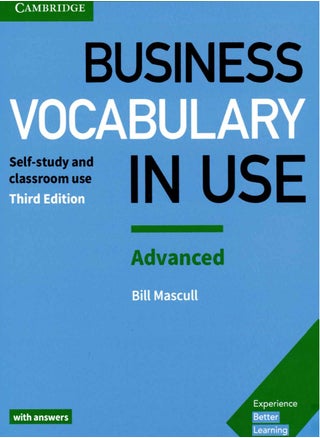| Book Description | Who is this book for?
Business Vocabulary in Use Advanced builds on the success of Business Vocabulary in Use
Intermediate. It is designed to help advanced learners of business English to improve their
business vocabulary. It is for people studying English before they start work and for those already
working who need English in their job.
The emphasis is on language related to today's important, and sometimes controversial,
business issues.
You can use the book on your own for self-study, or with a teacher in the classroom, one-to-one
or in groups.
How is the book organized?
The book has 66 two-page units. The first 59 of these are thematic and look at the vocabulary of
business areas such as human resources, quality, strategy, logistics, IT, marketing, finance,
corporate responsibility and the global economy.
There are then three units which focus on the language of the skills needed for doing business
across cultures. The final four units develop business writing skills.
The left-hand page of each unit explains new words and expressions, and the right-hand page
allows you to check and develop your understanding of the words and expressions, and how
they are used through a series of exercises.
There is cross-referencing between units to show connections between the same word or
similar words used in different contexts.
There is an Answer key at the back of the book. Most of the exercises have questions with only
one correct answer. But some of the exercises, including the Over to you activities at the end of
each unit (see below), are designed for writing and/or discussion about yourself and your own
organization or one that you know.
There is also an Index. This lists all the new words and phrases which are introduced in the book
and gives the unit numbers where the words and phrases appear. The Index also tells you how
the words and expressions are pronounced.
The left-hand page
This page introduces new vocabulary and expressions for each thematic or skills area. The
presentation is divided into a number of sections indicated by letters: A, B, C, etc., with simple,
clear titles.
In Business Vocabulary in Use Advanced, explicit reference is made to the business
material in the Cambridge International Corpus (CIC) - business pages of newspapers,
business textbooks, and business meetings and discussions. The texts are stored in a database,
which is searchable in various ways to reveal the patterns of business usage. The database has
been exploited to identify typical word combinations found in the data, and there are notes
about their relative frequency.
As well as explanations of vocabulary, there is information about typical word combinations.
Again, the CIC has been a prime source of information about these.
There are notes on the relative frequency of different words, for example:
How to use the book for self-study
Find the topic you are looking for by using the Contents page or the Index. Read through the
explanations on the left-hand page of the unit. Do the exercises on the right-hand page. Check
your answers in the Answer key. If you have made some mistakes, go back and look at the
explanations and the exercise again. Note down important words and expressions in your
notebook.
How to use the book in the classroom
Teachers can choose units that relate to their students' particular needs and interests, for
example areas they have covered in coursebooks, or that have come up in other activities.
Alternatively, lessons can contain a regular vocabulary slot, where students look systematically
at the vocabulary of particular thematic or skills areas.
Students can work on the units in pairs, with the teacher going round the class assisting and
advising. Teachers should get students to think about the logical process of the exercises,
pointing out why one answer is possible and the others are not (where this is the case).
We hope you enjoy using Business Vocabulary in Use Advanced. |
Free & Easy Returns
Best Deals


